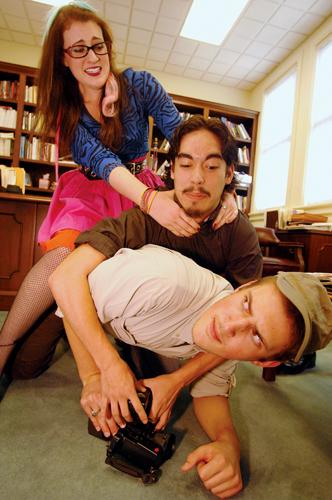“W-T-F, you guys!” Laura Hope is in stitches.
In room 501 of Marquette, she and the cast of “Jihad Jones and the Kalashnikov Babes” are cracking lewd jokes in between scene work.
The mood is jovial and energetic. The show, while delving deep into issues of ethnic stereotyping in Hollywood and intense moral conflicts of its players, is a comedy written by Yussef El Guindi, a long-time friend of Hope’s.
Hope is no stranger to the art of socially relevant plays. In 2007, she staged “Nine Parts of Desire,” a hard-hitting drama about the lives of Iraqi women during wartime. Then in 2008 she directed “Spinning Into Butter,” a show tackling the issues of both racism and political correctness.
This fall, in conjunction with the kickoff of the Middle Eastern Peace Studies minor, “Jihad Jones” will approach the issues of the stereotyping of Middle-Eastern Americans in Hollywood.
The play is centered on Ashraf, an American actor of Middle Eastern descent. He gets the break of a lifetime: starring in a Hollywood blockbuster. The problem is, he has been given the role of a terrorist, and a grossly stereotyped one at that.
He is faced with the gut-wrenching decision of ignoring his moral and ethical makeup by encouraging these stereotypes in Hollywood for a huge paycheck or giving up what could be the chance of a lifetime in exchange for his own self-worth.
“Hollywood is super liberal? [It] does an awful lot of stereotyping,” said Hope, who wishes to challenge the audience as well. In fact, she said, throughout time, Hollywood has picked its villains according to the political climate of the United States.
During the Cold War, the “bad guys” of film were the Soviets. During World War II, they were the Japanese.
Some, like author Jack Shaheen, who studies portrayals of Arabs and Islam by American media, argue that, in fact, Arab-Americans have always been portrayed as villains, and on top of that, largely incompetent and a sexual threat to the white females of the western world.
However, the actors of “Jihad Jones” have had to work twice as hard to carry these messages through due to an extremely short rehearsal period. Hope admits time has been one of the biggest challenges facing them. Auditions were held on the third and fourth day of school, and rehearsals started on the fifth.
Still, Hope was able to avoid wasting time during table work, when actors and crewmembers researched their parts, because “it’s [their] culture. For 18 years, they’ve been going to movies… [We asked them,] ‘what are you fighting for?'”
Still, with aspects of physical comedy, extensive prop use, stunts, tricks and even some elements of film during the staging, actors and technicians have had their work cut out for themselves.
“With this opportunity I have been working non-stop, but I am able to come to rehearsal and see a wonderful show coming together,” said Stage Manager Liz Iafelice, theater communications sophomore.
While it’s a comedy, director and actor alike challenge the audience to analyze the effect of Hollywood stereotypes have had on them.
“Just look at how people at Loyola might look at a girl in a headscarf,” said Hope. “Are there terrorists? Yes. But what kind of bill of goods are we really being sold?”
“Jihad Jones and the Kalashnikov Babes” runs Oct. 7 to 10 at 8 p.m., Oct. 11 at 2 p.m. and Oct. 14 to 15 at 8 p.m. in Lower Depths Theater on the first floor of the Communications/Music Complex.
Melanie Ziems can be reached at [email protected]








